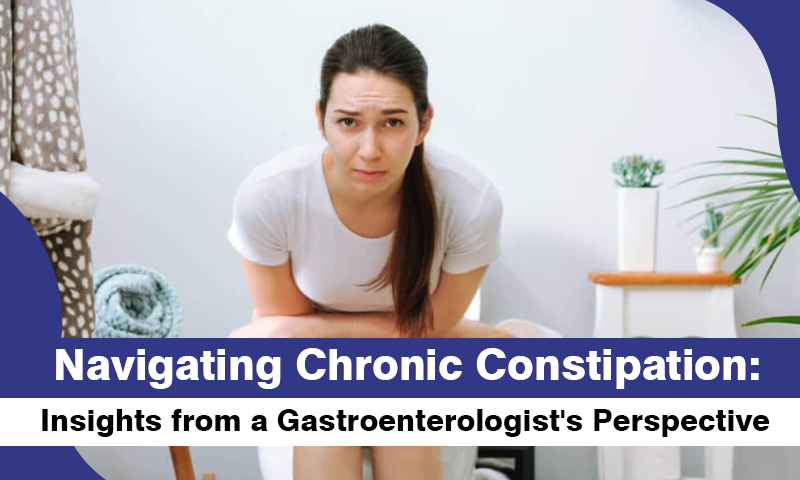Navigating Chronic Constipation: Insights from a Gastroenterologist’s Perspective

Unlocking Digestive Vitality: The Impact of Exercise on Gastrointestinal Health
May 15, 2024In the realm of gastroenterology, chronic constipation is a prevalent and often challenging condition to manage. Defined by infrequent bowel movements, difficulty passing stool, and associated discomfort, chronic constipation can significantly impact an individual's quality of life. As gastroenterologists, our approach to understanding and managing this condition is multifaceted, incorporating both medical interventions and lifestyle modifications tailored to each patient's needs.
Understanding Chronic Constipation: A Gastroenterologist's Viewpoint
From a gastroenterologist's perspective, chronic constipation is more than just a symptom; it is a complex gastrointestinal disorder with diverse etiologies and manifestations. While some cases may be attributed to dietary factors or insufficient fluid intake, others may be linked to underlying medical conditions such as irritable bowel syndrome (IBS), pelvic floor dysfunction, or neurological disorders.
In diagnosing chronic constipation, gastroenterologists employ a thorough clinical evaluation, including a detailed medical history, physical examination, and often additional diagnostic tests such as colonoscopy or imaging studies. By understanding the underlying pathophysiology of the condition, gastroenterologists can tailor treatment plans to address the root cause and alleviate symptoms effectively.
Treatment Options in Gastroenterology: A Holistic Approach
In our practice, we emphasize a comprehensive approach to chronic constipation management, integrating dietary modifications, pharmacological therapies, and procedural interventions as necessary. For many patients, dietary adjustments play a central role in improving bowel regularity and promoting gastrointestinal health. Increasing dietary fiber intake, particularly from sources such as fruits, vegetables, and whole grains, can enhance stool bulk and facilitate smoother bowel movements. However, it's important to note that dietary recommendations should be individualized, taking into account each patient's specific needs and tolerances.
In addition to dietary interventions, pharmacological therapies may be prescribed to augment bowel function and alleviate symptoms. Prescription medications such as osmotic laxatives, prokinetic agents, or lubiprostone can help stimulate intestinal motility and ease stool passage. Gastroenterologists carefully evaluate the appropriateness of these medications based on the patient's clinical presentation and medical history, ensuring optimal efficacy and safety.
For select patients with refractory chronic constipation, procedural and interventional therapies may be considered. Endoscopic procedures such as colonic irrigation or sacral nerve stimulation offer targeted approaches to address underlying anatomical or functional abnormalities contributing to constipation. In severe cases, surgical interventions such as colectomy or rectopexy may be warranted to alleviate symptoms and improve quality of life.
Lifestyle Modifications for Gastrointestinal Health
Beyond medical interventions, gastroenterologists emphasize the importance of lifestyle modifications in managing chronic constipation. Regular physical activity has been shown to promote gastrointestinal motility and enhance bowel function. By incorporating exercise into their daily routines, patients can stimulate intestinal contractions and facilitate more regular bowel movements. To learn more about the role of physical activity in gastrointestinal health, consider consulting with a specialist such as Dr. Chirayu Chokshi, a renowned gastroenterologist based in Vadodara, India.
Hydration is another essential aspect of gastrointestinal care, as adequate fluid intake helps maintain stool consistency and prevent dehydration. Gastroenterologists recommend consuming sufficient water throughout the day, aiming for at least eight glasses or more depending on individual needs and activity levels. By staying hydrated, patients can support optimal bowel function and overall digestive health.
Establishing a structured bowel regimen is also crucial for managing chronic constipation effectively. Gastroenterologists work closely with patients to develop personalized bowel routines, incorporating strategies such as scheduled toileting, relaxation techniques, and biofeedback therapy. By establishing consistent habits and routines, patients can train their bowel muscles to function more efficiently and minimize symptoms of constipation.
Integrative Approaches in Gastroenterology: Exploring Probiotics and Complementary Therapies
In recent years, there has been growing interest in the role of probiotics and complementary therapies in gastrointestinal health. Probiotics, which are beneficial bacteria that promote gut health, have shown promise in alleviating symptoms of chronic constipation. By restoring the balance of gut microbiota, probiotics can enhance digestive function and improve stool consistency. To learn more about the potential benefits of probiotics for constipation management, consult with a gastroenterologist like Dr. Chirayu Chokshi, who specializes in integrative approaches to gastrointestinal care.
In addition to probiotics, complementary therapies such as acupuncture have gained attention for their potential therapeutic effects in gastrointestinal disorders. By stimulating specific acupoints associated with bowel function, acupuncture may help regulate intestinal motility and relieve symptoms of constipation. While further research is needed to fully elucidate the mechanisms underlying acupuncture's efficacy, many patients report significant improvements in their gastrointestinal symptoms following treatment.
In addition to probiotics, complementary therapies such as acupuncture have gained attention for their potential therapeutic effects in gastrointestinal disorders. By stimulating specific acupoints associated with bowel function, acupuncture may help regulate intestinal motility and relieve symptoms of constipation. While further research is needed to fully elucidate the mechanisms underlying acupuncture's efficacy, many patients report significant improvements in their gastrointestinal symptoms following treatment.
Psychological Support and Patient Education: A Collaborative Approach
In addressing chronic constipation, gastroenterologists recognize the importance of psychological support and patient education. Chronic constipation can have a profound impact on mental well-being, leading to feelings of frustration, embarrassment, or anxiety. By providing empathetic care and psychological support, gastroenterologists can help patients navigate the emotional challenges associated with their condition.
Patient education is also integral to effective chronic constipation management. Gastroenterologists empower patients with the knowledge and resources they need to take an active role in their care. By understanding the underlying mechanisms of their condition and adopting healthy lifestyle habits, patients can optimize their gastrointestinal health and improve their overall quality of life.
In conclusion, chronic constipation is a complex gastrointestinal disorder that requires a comprehensive approach to management. As gastroenterologists, we strive to address the underlying causes of constipation and provide individualized treatment plans tailored to each patient's needs. By incorporating dietary modifications, pharmacological therapies, lifestyle changes, and complementary interventions, we aim to alleviate symptoms, improve bowel function, and enhance overall quality of life for our patients.
For those seeking expert guidance in chronic constipation management, consider consulting with a specialist such as Dr. Chirayu Chokshi, a distinguished gastroenterologist in Vadodara known for his expertise in gastrointestinal care. By partnering with a knowledgeable and compassionate healthcare provider, you can embark on a journey towards better digestive health and a happier, more fulfilling life.


